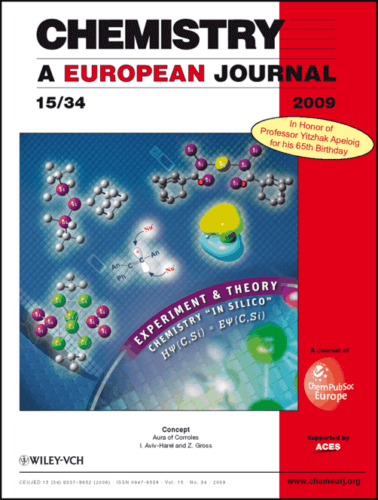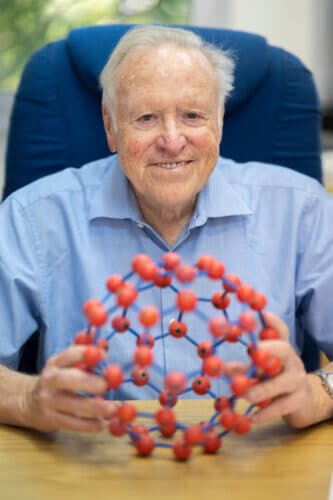The former president of the Technion will receive the medal for his important computational and experimental contributions to silicon chemistry and organic chemistry

Research Prof. Yitzhak Apluig from the Shulich Faculty of Chemistry Won the Schrodinger Medal for 2021 on behalf of the World Association for Theoretical and Computational Chemistry, WATOC. Past winners of the medal include four Nobel laureates in chemistry and many of the pioneers of computational quantum chemistry.
The prestigious medal is awarded each year to only one scientist, whose contributions to theoretical and computational chemistry are particularly prominent. The medal will be awarded to Research Prof. Apluig for his pioneering contributions to the chemistry of organosilicon compounds and organic chemistry, and for the impressive combination of experiments, theory and calculations in his research.
Research Prof. Apluig joined the Technion faculty in 1976 and in 2009-2001 was the Technion's president. He is one of the world's pioneers in the use of computational tools based on the theory of quantum mechanics to predict the properties and reactions of molecules, and the pioneers of the chemistry of organosilicon compounds. He has previously won many important awards, including the Taub Award for Academic Excellence and Teaching Excellence Awards from the Technion, the Humboldt Award, the Japan Society for the Advancement of Science Award, the Gold Medal of the Israel Chemical Society, the Wacker Award and the Kipping Award for Silicon Chemistry from the American Chemical Society. He is an honorary member of the American Academy of Arts and Sciences, a member of the European Academy of Sciences, an honorary doctor of the Technical University of Berlin, holder of an honorary degree from the President of Germany and beloved of the city of Haifa.
World Society for Theoretical and Computational ChemistryWATOC works to promote computational and theoretical chemistry and to strengthen ties between scientists working in these fields, and its last conference was attended by about 1,500 scientists from around the world.
Schrödinger's equation - the basis of quantum physics
Schrödinger medal Named after the Austrian physicist Erwin Schrödinger, one of the forefathers of the theory of quantum mechanics and winner of the Nobel Prize in Physics (1933), who developed a wave equation named after him, the Schrödinger equation. The equation describes the behavior of atomic particles, for which Newtonian mechanics is not applicable. Solving the equation provides us with all the information about the properties of a certain molecule or substance and allows us to predict in advance the properties of unknown substances. Solving the Schrödinger equation is mathematically very difficult, and until the development of electronic computers was only possible for very small molecules, such as the hydrogen molecule. With the improvement in the calculation speed of the computers, quantum mechanical calculations became possible even for relatively large molecules, and nowadays also for large biological molecules such as proteins.

Some members of the WATOC community are engaged in the development of mathematical methods and computer programs to solve the equation, and another, such as Prof. Apluig, is engaged in applying the methods to investigate and predict the properties and reactions of various materials. Prof. Apluig was one of the first experimental chemists in the world to understand the potential inherent in computational methods and has been applying them in his research since the XNUMXs. Today, there are many studies in chemistry, academia and industry (development of innovative materials, development of new drugs, etc.), in which computational tools are also used, usually in cooperation between experimental and computational groups. One of the unique characteristics of Prof. Apluig's research is that the experimental and computational research is usually carried out by the same student, who acquires knowledge and experience in both disciplines, which is important for scientific development.
More of the topic in Hayadan:
- Professor Yitzhak Apluig, former president of the Technion, was elected to the Academy of Arts and Sciences of the USA
- A professor from the Bar Ilan School of Engineering won the prize of the International Commission on Optics
- Erwin Schrödinger. A fierce opponent of the Nazi regime and the proud owner of a quantum cat

One response
The Schrödinger medal is received and not received at the same time